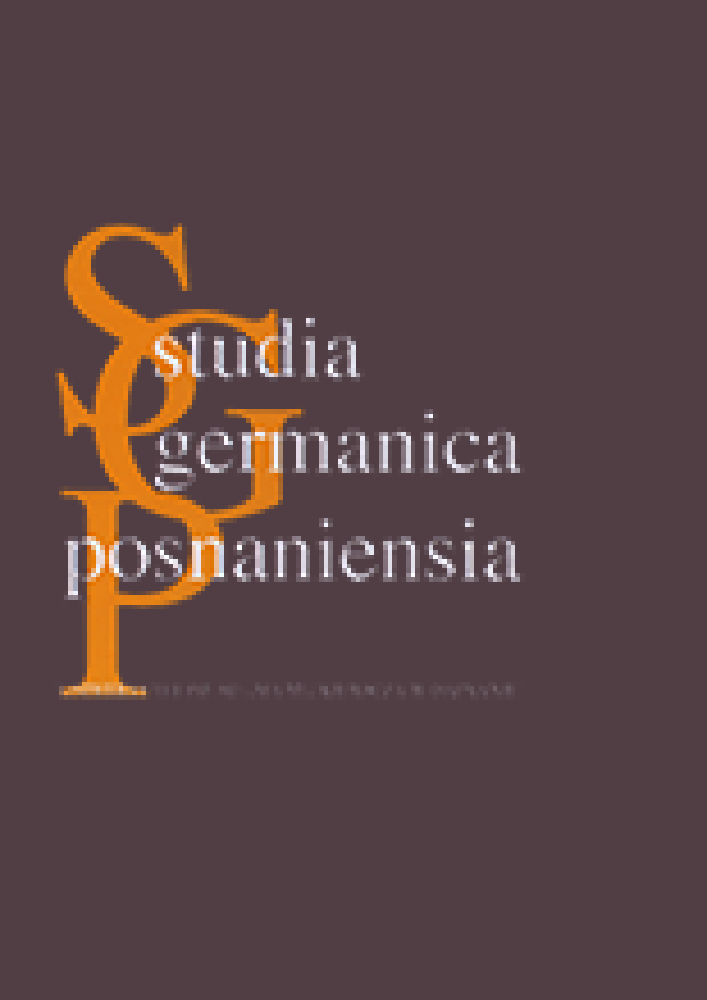Abstract
According to Derridas Monolingualism of the Other, Or, The Prosthesis of Origin every person is always multilingual. If we understand this state of non-monolingualism as a general human phenomenon, which the so called ‘exophone literature’ particulary helps us to do, then we understand that to question a stranger’s alienation always means to question our own alienation at the same time. Thus the question of the stranger becomes the question of one‘s own identity. In my article, I analyze this phenomenon by combining Hamid Sadr’s ‘novel’ Gesprächzettel an Dora (1994) and Jacques Derrida’s concept of mono- and multilingualism. In Hamid Sadr’s text the narrator uses egodocuments to invent a truth about Franz Kafka’s death which opposes many literary scholars and biographers who have interpreted Kafka’s death as a consequence of his existence as a poet, his diremption etc. What alienates the literary figure named Kafka from us is the language itself, and first of all the combination of allegedly ‘authentic’ documents with the unreliable narrative voices, thus revealing the constructiveness of ‘Kafka’. The main character Kafka – who within the text is named K., Kafka, kavka and who is introduced into the text by using his ‘own’ words, that supposedly precede him and yet, at the same time, succeed him – is deconstructed. Borders between cause and effect, before and after, reality and fiction, life and death become obsolete thus turning the Kafka/K. figure into a wanderer, a figure of ‘both-and’. Kafka’s situation as a stranger, as a kind of exile in the remoteness of the sanatorium, is not alone a parable on the situation of an exile, as Sadr’s personal life may indicate. Moreover, as I will show, it is a metaphor for human identity in general.
References
Bachmann, I. (1993). Der Fall Franza. In I. Bachmann, Werke 3 (S. 339-482). München: Piper.
Barthes, R. (1986). Sade Fourier Loyola. Frankfurt a. M.: Suhrkamp.
Bittel, J. (o. J.). ‚Sterben, Schlafen – Schlafen, Träumen vielleicht.‘ Zum Spiegelstadium bei Lacan Teil I. Abgerufen am 25.10.2019 von http://www.salmoxisbote.de/Bote08/Bittel.htm.
Butler, J. (1991). Das Unbehagen der Geschlechter (K. Menke, Übers.). Frankfurt a. M.: Suhrkamp.
Derrida, J. (1982). Die Postkarte von Sokrates bis an Freud und jenseits. 1. Lieferung: Envois/Sendungen (H.-J. Metzger, Übers.). Berlin: Brinkmann & Bose.
Derrida, J. (2003). Die Einsprachigkeit des Anderen oder die ursprüngliche Prothese (M. Wetzler, Übers.). München: Wilhelm Fink.
Hoenig, M. (o. J.). Kafkas letzte Lebenswochen in einem Roman dargestellt [Besprechung von Hamid Sadrs Gesprächszettel an Dora]. Abgerufen am 25.10.2019 von http://members.aon.at/hamidsadr/sadr/roman2.html.
Internetseite des Autors. Abgerufen am 25.10.2019 von www.hamidsadr.com.
Jelinek, E. (2004). Im Abseits. In P. Janke (Hrsg.), Nobelpreis Elfriede Jelinek (S. 227-238). Wien: Praesens.
Kafka, F. (1996). Ein Hungerkünstler. In F. Kafka, Drucke zu Lebzeiten. Hrsg. von W. Kittler, H.-G. Koch & G. Neumann (S. 315-377). Frankfurt a. M.: Fischer.
Kristeva, J. (1986). Word, Dialogue and Novel. In T. Moi (Hrsg.), The Kristeva Reader (S. 34-61). New York: Columbia University Press.
Kristeva, J. (1990). Fremde sind wir uns selbst (X. Rajewsky, Übers.). Frankfurt a. M.: Suhrkamp.
Lücke, B. (2007). Elfriede Jelineks ästhetische Verfahren und das Theater der Dekonstruktion. Von Bambiland/ Babel über Parsifal (Laß o Welt o Schreck laß nach) (für Christoph Schlingensiefs „Area 7“) zum ‚Königinnendrama‘ Ulrike Maria Stuart. In P. Janke & Team (Hrsg.), Elfriede Jelinek: „ICH WILL KEIN THEATER“. Mediale Überschreitungen (S. 61-83). Wien: Praesens.
Ludi, G. (1996). Mehrsprachigkeit. In H. Goebl, P.H. Nelde, S. Zdenĕk & W. Wolck (Hrsg.), Kontaktlinguistik. Ein internationales Handbuch zeitgenössischer Forschung. 1. Halbband (S. 233-245). Berlin: de Gruyter.
de Man, P. (1993). Autobiographie als Maskenspiel (1979). In P. de Man, Die Ideologie des Ästhetischen (J. Blasius, Übers.) (S. 131-146). Frankfurt a. M.: Suhrkamp.
Messina, C. (2010). Zweisprachigkeit vs. Mehrsprachigkeit. In M. Bürger-Koftis, H. Schweiger & S. Vlasta (Hrsg.), Polyphonie. Mehrsprachigkeit und literarische Kreativität (S. 107-133). Wien: Praesens.
Nietzsche, F. (2012). Der Wanderer und sein Schatten. Zweiter und letzter Nachtrag zum Buch der freien Geister. Köln: Anaconda.
Sadr, H. (1994). Gesprächszettel an Dora. Wien: Deuticke.
Scheer, U. (25. Juni 1994). Demontage einer verwirrten Dohle. Die Welt, 21.
Skiba, D. (2010). Formen literarischer Mehrsprachigkeit in der Migrationsliteratur. In M. Bürger-Koftis, H. Schweiger & S. Vlasta (Hrsg.), Polyphonie. Mehrsprachigkeit und literarische Kreativität (S. 323-334). Wien: Praesens.
Vlasta, S. (2015). Contemporary Migration Literature in German and English. Leiden: Brill.
Wallmann, H. (27. April 1994). Bitte, betrachten Sie mich als einen Traum. Hamid Sadr macht uns Kafka wieder fremd: ‚Gesprächszettel an Dora‘. Süddeutsche Zeitung, 15.
